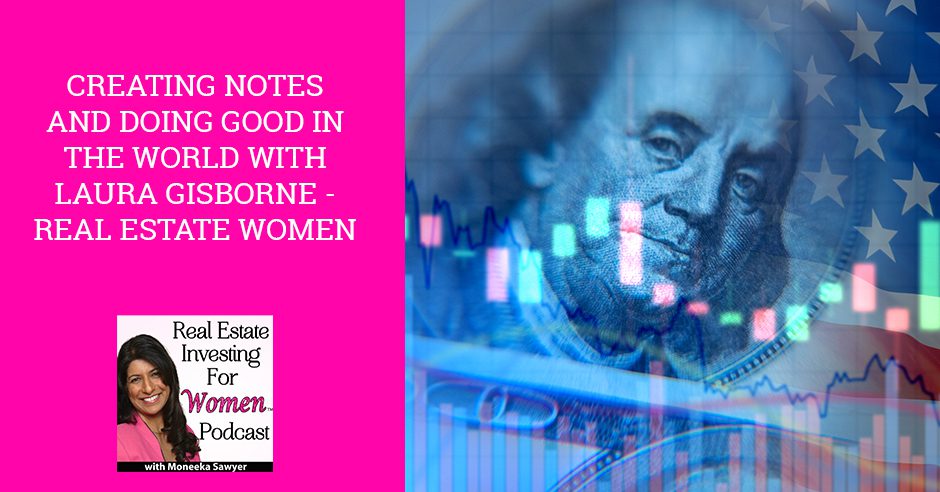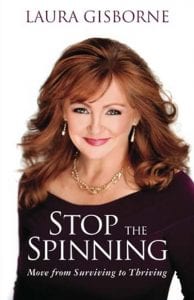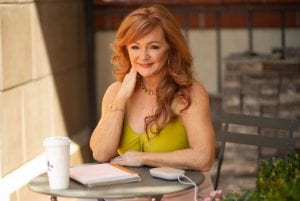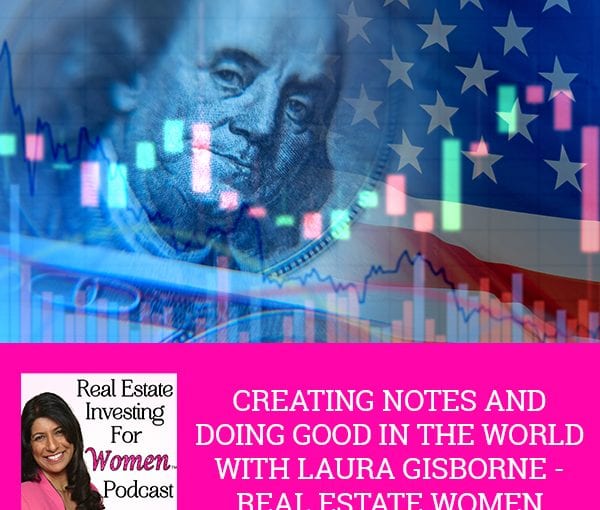Creating Notes And Doing Good In The World With Laura Gisborne – Real Estate Women

Too often, many people make real estate investing seem harder to get into than it actually is. In fact, for Laura Gisborne, you don’t necessarily need to know everything. You can just start by buying a property, adding value to it, and watching it take you to the next. In this episode, she joins Moneeka Sawyer to help simplify the process for us. As a highly successful business expert with over 20 years of experience from structuring and selling small boutique businesses to owning a multimillion-dollar wine and real estate empire, Laura has the wisdom and insights that could help us find our path towards success. She shares some of those with us and how, more importantly, she is giving back. Tune into this conversation to learn more about creating notes and going the owner financing route, all the while doing good in the world with it.
—
Listen to the podcast here:
[fusebox_track_player url=”https://feeds.podetize.com/ep/pr3dYLub4/media” title=”Creating Notes And Doing Good In The World With Laura Gisborne – Real Estate Women” ]Creating Notes And Doing Good In The World With Laura Gisborne – Real Estate Women
Real Estate Investing For Women
I am excited to welcome you to the show laura Gisborne. She is a highly successful business expert with many years of experience. From structuring and selling small boutique businesses to owning a multimillion-dollar wine and real estate empire, she has owned nine businesses. Her first, when she was only 23 years old. She is an internationally recognized speaker and serves as a business consultant for business leaders and entrepreneurs in a wide range of industries. The innovative business model of her company, Limitless Women, exemplifies that companies can be both profitable and purposeful.
Through her initiatives, thousands of women and children are receiving regular contributions in multiple countries across five continents. She has served as a Guardian Ad Litem for foster children through CASA, Parent Education Coordinator for Family Outreach, board member for Habitat for Humanity, The New Peaks Foundation, and is on the Business Engagement Team of the Pachamama Alliance. They’re all important and relevant for what Laura stands for, that’s why I wanted to let you know what she’s about around all of this stuff. She is the author of the books, Stop The Spinning: Move From Surviving To Thriving and Limitless Women. She has been featured as a guest expert on both CBS and ABC, as well as on the national bit show, The List. Laura, welcome to the show.
Thank you, Moneeka.
Laura and I are part of a community called The Thriving Women in Business. We met at a luxury retreat with a bunch of other women in Hawaii and hit it off immediately. We have much in common. I wanted to have her on the show to share all of her wisdom with you. Laura, why don’t you start by telling us a little bit about your real estate journey? What’s your story around that?
First of all, thank you for inviting me. I’m super excited to serve you and to help however I may. Ask away whatever questions you’d like to ask. For the real estate journey, it’s interesting. I started back in 1996, I went on a timeshare tour. I don’t know if you’ve ever been on a timeshare tour or not, but it was a fascinating thing. I had no idea what it was. I said to my husband at that time, “We’re not going to buy anything. Let’s go look.” The woman who was our real estate broker, which is like you and I, we hit it off. We had a great affinity right away. The story behind the story is at that point, we had owned three restaurants in Texas.
We sold them and moved to Arizona with the idea we’re going to open up a different kind of business. A bed and breakfast or something that we could do with small hotels. Something we could do while one of us could always be with our children. This woman who sold us a timeshare said, “You should get a real estate license. You’d be great at this.” I said, “I’ve never sold anything in my life.” My background is hospitality and law.” I thought I’d be a lawyer when I grow up. God had another plan to get all these adventures, but that’s a whole other story. It took about two months at the time to get a license if you went full-time.
I got my real estate license. I thought, “This would be a good side hustle to do in the meantime. I’ll get into real estate and do that for a little while, while I’m building my next business.” I started selling, doing well in real estate. I started taking my commissions from real estate sales and buying real estate. Leverage was a beautiful thing back in the late ‘90s, early 2000s. I would buy one piece of property and then get it ramped up and then borrow against that property to buy the next one and so one thing led to another.
It’s intuitive investing. That’s what I did too. I did not become an agent, but once I started buying, I would fix it up, have it increased its value, and then take money out and buy the next one. It’s such an easy way to go. What I love about your story is that it shows women that this thing is possible in an intuitive, flowing way. There’s no magic here. You made some extra income. You decided to invest in property. That property was appreciated because you added value. You take more money out and then you bought another piece of property and just rinse and repeat. What I want ladies to read at this moment is how easy this can be because many people out there are talking about the cool ways or exciting ways to make money in real estate. You could buy everything and no money down. You can do these options and syndication. You don’t have to know all of that stuff. You can just buy a house.
That’s the piece, start with one. My first husband that I got divorced, almost two years after we’d moved to Sedona, I met my current husband. When he and I got married, he moved into my house. We turned his house into a rental. It was that piece. He said, “I can buy you a diamond. I can buy this empty lot.” I was like, “No, buy the lot. Diamonds later. Let’s get some real estate.” It’s a little hedgy. You want to start collecting and our strategy was to cashflow properties. I went to a real estate investing bootcamp in 2004 with John Burley, who was a great guy. Burley looked at what were the different strategies that were working and what works best for us over the years. I would say, it has been that cashflow that we would buy a house and then we would carry the note for somebody who was having a challenge with financing. We do owner finance for them. It worked out great. When they were ready and they were able to qualify, they were able to buy us out and it always became a great win for them too.
If you drive out of the epicenter of your city, the farther you get, the lower the prices of the houses become. Share on XLet’s dive a little deeper into that because that’s not something people have talked a lot about in this show. When we talk about cashflow, usually what people think is you buy a place, rent it out for more than what you owe on it and that’s how you make cashflow. There are lots of different ways to do cashflows. Let’s dive a little deeper into the owner financing route. We haven’t had anybody talk about that. Could you break that down for us a little?
One of the things you always have some questions about is, “What do you need to get started?” Good credit is a great asset. It’s not necessarily the only asset because even if you struggle with credit, you can bring in partners. That’s also been another strategy that was successful for us to joint venture with other investors so that we can pull our money together. We’d put in 10%, they’d put in 10%. We get our 20% down, and we would go in and do a project. That was a whole other side. Generally, we would buy a house. The strategy behind this was that we live in a high ticket area.
As real estate investors, the rule of thumb that we’ve found over the years is that if you drive out for the epicenter of your city, the farther out you get, the lower the prices of the houses become. We’ve always done well with cashflow properties from blue-collar type of families like firemen, school teachers, people that have great jobs. They may not have high revenue, but they have consistent income. They have a good job history. People fall on hard times. I talk about that in my first book. I went through my journey when I got divorced. It didn’t make my life easy with my credit. I made some mistakes, but I cleaned them up and was able to move forward.
When somebody’s gone through some life situation like death or divorce or disease, you can look at their credit and find out, “Was it an isolated time? Do they have a better history before?” Banks are not always forgiving, but as a lender yourself, you can be forgiving. You can find those people that you trust and work with them. A lot of times, that gives them the opportunity to get into a house, and our structure was, let’s say somebody who normally would pay $1,000 for rent if they were doing a lease option which is the owner finance with us who would have them pay more. Maybe they’re paying $1,300 or $1,400 a month, but a portion of that would be going towards the purchase of the property.
If they could get it together and then get their own financing, which happened for every house we ever had in Arizona, they always ended up cashing out which was great. You think as you keep them as high ticket renters for a long time, but the goal is to help others get into their own homes. You figure out a price, you buy your house for $100,000 and you decide to sell it to them for $120,000. They live there for a few years, pay the rent, and because they had an ownership in the property, they would take better care of the property first and foremost. They wouldn’t call you for every like, “I need a new light bulb,” because it’s their property. They had pride in that.
Did you get a down payment and what percentage would you normally get?
It depends on where they were. That’s the idea too. I know a lot of people that do resell houses with no money down and 4 or 5 high ticket leases. Our intention was always to have a win for them and have them be able to get to a place that they could afford.
You did take some down payment so they felt like they had bought?
Let’s say that you’re doing a security deposit on a rental. You do first, last and one-month security on a $1,200 property, that’s $3,600. Over time, they came up with $5,000. We didn’t charge them much more. The round numbers we love working-class neighborhoods as families. Those are the ones that get the hardest hit when the economy goes south.

Stop The Spinning Move: From Surviving To Thriving
With a lot of the owner financing that I’ve seen, they’re structured a little bit differently. What kinds of percentages do you normally give them towards their house, for instance?
People that are credit challenged are used to paying a little bit more interest. The interest didn’t come into the equation so much. If I could give you a base rate, it would be like interest rates you’ll see out there is 3%, if I charged 5% or I charge a little bit higher interest rate because it was a higher risk. It was more tied into the lease option.
You would charge an interest rate and everything else went towards paying down their house?
Correct.
Did you normally still have a loan on that property when you did this?
Yes.
That is such an interesting structure. I’ve never seen it like that before.
It worked well for our family and it made us feel good to be able to help people get into houses that couldn’t get in otherwise.
They’re the ones that usually get hit hard when things go bad and it’s not that they don’t want to own homes for their families, nor that they don’t work hard enough for it.
We want to be with people who inspire us, the people who lift us up, and see us when we have a hard time seeing ourselves. Share on XIt’s the idea of 10% down payments. It’s hard for them versus if they can come up with a little bit down and then pay a little bit more each month. It’s like a savings account for them to move towards where they have the equity. The house is also appreciating at the same time. It was all these years in Arizona. When they go to refinance and qualify for a more traditional loan, they’ve got some equity in their other down-payment and they would cash us out.
How quickly do they normally cash you out? How quickly do they normally buy?
It’s an average of 2 to 3 years. That’s in a market where lending was more flexible. We don’t know what’s going to happen after COVID. It’s going to be interesting to see what the banks do. Interest rates are at an all-time-record low and certain things are easier to get financing for than others.
Do you help them with getting their credit fixed if they’ve had any problems or you allow it to season its way out?
No, I think they season. If they’re motivated to buy, to purchase, they know they have to make their payments on time. I’ve met a lot of people over the years when they go all-in on hard times are good people who needed a chance to pull it together and get back on their feet.
One of the things that I love about Laura is her whole outlook on life is she wants to be a limitless woman herself. She believes in time, emotional freedom, financial freedom and true freedom. Being truly limitless and lifting the people around her. She reaches out into the world in many ways whether it’s being on boards of charities or that she finances people in their homes or the way that she coaches her business, coaching clients. Everything that Laura does, her aim is to lift those people around, to be better off than they were before.
Part of what struck me about Laura in the very beginning when I first met her is she’s always, “How can I be a service for you? What can I do at this moment to help you?” She comes from this place that I call one of my bliss tenets, which is to give back to the world, to be of service. When we’re out there and serving, it’s hard to feel bad inside. We’re being of service, but it also fills us up. It gives us more to think about, to do, to feel good about. It also helps us to raise the vibration around us because anybody who then is going to come around us are going to be people that have that same vibration, intention, and blessed in their life. Wouldn’t you say?
I would. I went to a yoga class right before you and I have this interview. I was listening to a sermon on the way. One of the things he was talking about was how much we can be around people that pull us down and how important it is for us to always surround ourselves with others who lift us up. I feel like I’m hearing it twice. God must be giving me a message. This idea of who we surround ourselves with is important. We want to be with people that inspire us, that lift us up and see us when we have a hard time seeing ourselves.
That’s kind, generous and uplifting. I know much of the time when I’m not down as often as I had been. A lot of my journey to bliss was because my life experience was very unhappy. We often focus on the things that have challenged us ourselves. I remember learning early on this thing that everybody says, you become the five people you spend the most with. It sounds trite. The truth is the most time that you spend with people, those are the people that are going to influence you the most. It’s important that you decide who you want those people to be and you do have control over that.

Creating Notes: Banks are not always so forgiving, but as a lender yourself, you can be and you can actually find those people that you really trust and work with them.
We don’t have control over the family and don’t dump your family. You don’t want to do that. You want to make sure that when you’re out there in the world, when you have the choice, you’re choosing people who are going to support the joy in life, help to uplift you and support your values. I can’t imagine Laura ever hanging out with someone that did not believe in philanthropy.
It’s not a new journey for me. The work that I do is all about business training, to lift women so that they can use their profits for purpose. All of that’s come as a typical overnight sensation. I started volunteering many years ago. While I was building my private sector life, our restaurants, our retail stores, our real estate and our wine business, I was always volunteering as a separate. I felt like I had one foot in either world. I had a private-sector world and my volunteer world. What’s been beautiful is over these last few years, we put our stake in the sand and made our whole business about fundraising and raising awareness.
Even prior to that, even when we were percolating this business starting about 2012, that was always a common theme. We’re good. We’ve raised our children. We’ve traveled the world. My husband had a terminal diagnosis many years ago and now he is healthy and on track. We’re thrilled. We try to celebrate every day that we get to have together. For us, the motivation is not about how do I make more money. I’m more curious about how I can use my experience and my voice to lift up other women that they can find sufficiency and freedom for their families, and then join us in the contribution phase. What we know from experience of doing this work now is it’s difficult for women to see themselves as philanthropists and givers when they’re struggling financially. We need to help them get to sufficiency first.
You and I both started at a place where we weren’t in a financial place that people would normally think of us as givers. I started my philanthropic journey when I was sixteen living in India. I didn’t have a lot of money and we started to volunteer time, and a little bit of money for me. It was $10 a month. It’s important that we feel lifted up enough. You don’t want to give when you don’t feel like you have. You never want to give them more than you feel you can give. That is true whether it’s of your heart, time, or money.
There’s a little paradox in that for me only because it’s my understanding and my core premise at this point in my mid-50s. I grew up in a very poor family. I did not have access to resources and no one had ever been to college. It was that whole idea of education and freedom. It wasn’t something that we had access to and didn’t know that access. My parents did their best to ingrain in me. I can do attitude and willingness to work hard. I’ve always been a good student. I’ve got a lot of gifts and a lot of things that have come through that helped me again when I couldn’t see myself.
The most successful people that I knew and that I’ve had the blessing of knowing throughout my journey at this point are people who were always generous of heart, generous of spirit. It wasn’t someday when they got wealthy that they gave. It was getting through the stretching through the expansion. There’s something in that for us. I believe that giving causes growth. It’s an interesting paradigm when women come to one of our programs and they want education on how to build a business. I asked them to make a donation in exchange for your education. There’s often a little hesitancy if that’s a new paradigm for them. They haven’t done it before. I say, “If you can afford to invest in yourself here, you can afford to give there.” What it does is it starts them being expanded. This is either they can, then they start being a whole different level of leader.
We’re saying the same thing. I feel that women often over give. In their homes, they say yes too often. That’s more of what I was referring to about, we do need to keep ourselves filled up emotionally, internally, and mentally so that we can then stand in our power in the world. What’s also funny is that you will never expand until you understand that being of service is the most important thing. When you are able to start to understand that, then you expand in every way. You expand emotionally in your capacity to give, your compassion, wisdom, personality and also wealth.
My husband learned something from me very early on. We were broke as newlyweds. I remember one day, we were talking about the budget and I said, “I still have to donate to the temple.” He says, “We pass on it this year.” I said, “No. We’re going to double it this year,” which frustrated him. For me, when I start to close down, to cringe, feel that I can’t do it, is when I open up even more because then that releases all of that. Now, money, energy and creativity start to flow.
It sounds like it’s your story. It sounds like it’s your truth.
If we've been blessed to have an opportunity to do well for ourselves, who else can we help so that they can do the same? Share on XDo you find that’s also true for other people?
It depends on where they are. There’s some truth in Maslow’s hierarchy of needs. When somebody is in survival mode, I’m always in awe, when I meet people who live on less than $3 a day, who find a way to give. There’s a place where a lot of times there’s a spiritual component that kicks in. Most people that I meet in the developed world are still running the myth of not enough, but they’re still trying to be more, do more, have more. Yet, if they can’t overcome that, then my conversation is not the right conversation for them. If they’re stuck in that, then all we can do is love and try to support them as much as we can with where they are.
What do you mean by a limitless woman?
Monica Nyiraguhabwa, who you’re familiar with, is also a donor for Girl Up Uganda through Kimberly Writing Women In Business Giving Circle. When I met this woman who’s in her mid-30s, I started to learn more about her story. She’s incredibly humble. You don’t know that until you start getting in there and digging in. She grew up in the suburbs of Kampala. She had her first pair of shoes at age thirteen. People may or may not know this, but in most places in the world, education is not free. She had to come up with school fees.
Her parents had to decide, “Do we send our son or daughter to school?” They decided to send their son because chances are, he would stay in the village versus her getting married and moving away from the village. She was resourceful. She started selling vegetables. She found a way to make her school fees. She started this at about age seven. It was mind-boggling to me. She went on the Government of Uganda partnered with the University of London and created a scholarship fund for five students in the entire country. There were 5,000 applicants. She was one of the five students who got the scholarship, went to England, stayed on for a Master’s degree in Public Policy, and then came back to Uganda to the slums. I mean no electricity, no water, no roads, no transportation, and decided to dedicate her life to lifting up other young women.
They wouldn’t have to be in a family where a family had to choose. That to me is a limitless woman. Everything that was presented to her was what we would consider I believe a limitation and she chose not to see it that way. She chose to stay deep in her faith to keep taking the next step that she could. She’s an Obama scholar, spoken to United Nations, on the Today Show. She’s right there in Uganda, in the trenches, making a difference for hundreds of thousands of girls. A lot of times when we face adversity in our lives, things that could be in way, perspective is important. For me, there’s nothing at this point in my life that makes me more excited than supporting a woman like that who’s out to change the world.
That was an amazing story. Thank you for sharing it.
She’s a limitless woman. That to me is the epitome of a woman who overcomes amazing adversity. An ordinary girl with extraordinary faith and perseverance. She chose not to just make it about herself. She has nine adopted daughters. She’s 36 or 38. She’s my relevant hero. I have many of them. It’s this work of how do we, as women, lift each other up? How do we as women continue to shift the idea that there’s any competition? There’s no competition. There’s a tremendous amount of abundance in the world. There’s a tremendous amount of resources.
If we’ve been blessed to have an opportunity to do well for ourselves, meaning that we’ve reached sufficiency. We’ve been able to take care of ourselves, our families. Who else can we help so that they can do the same? My family of origin could not help me past a certain point because they didn’t have any reference. They didn’t have any perspective. There were other people who saw me from the outside who said, “You can do this. There are other possibilities. Somebody has to open up and shine a light on what’s possible.” I feel like I’ve been very blessed. All the way plus up to this point, and as long as God lets me stay here. It’s good to be here.

Creating Notes: The epitome of a woman who overcomes amazing adversity is in being an ordinary girl with extraordinary faith and perseverance and choosing not to just make it about herself.
Laura, how can people reach you if they want to get in touch with you and find out more?
The easiest way to get connected with me is through the web. If you go to Free Gift Friday, you can opt in for a copy of my first book, Stop the Spinning: Move from Surviving to Thriving,where I tell my own limitless woman story, where I came from and where life has taken me. It’s a little bit of that journey and the power of the formula. The tools and the resources that I and the most successful women I know used to keep themselves on track financially, with the time, their operations, and community. You can always contact me through the website, LimitlessWomen.com. There’s a Contact Us form that comes right to me.
Ladies, I would go there and get that book. That sounds amazing. I know I’ll be doing that. Laura, are you ready for three rapid-fire questions?
Yes.
Give us one super tip on getting started in real estate investing.
One of the fastest ways that you can grow your real estate business is to get comfortable with using other people’s money. When you think like an investor, you look at how the profit on a property is made when you buy it, not when you sell it and you get clear about your numbers, metrics which all are part of the education. You can bring in business partners because everyone will run out of their own money at some point. If you want to keep growing, you want to keep expanding your business. Learn early on how to make it a win for other investors. A lot of people don’t necessarily have the time or inclination to get an education. If you’re one of those women who’s motivated by giving the education, understanding how to do this, and you partner with someone who’s an investor, who wants to get a good return on their investment, but they don’t want to have to do all the work, that’s probably the best super tip that moved us the fastest.
What would you say is a strategy to be successful as a real estate investor?
You have to get clear about what your revenue-generating activities are. If you’re not writing offers on houses, connecting with investors, and bringing in joint venture partners, not advertising your properties and finding leases, you’ve got to get clear to where are the actions that drive your revenue, not shopping. Shopping as fun as that is, that’s not always the best thing to be spending your time on. Get clear about your paradigms. Get your education in place, and then get into the actions that going to bring in revenue to your company.
What is one daily practice that you would say contributes to your success?
One of the fastest ways to really grow your real estate business is to get comfortable using other people's money. Share on XI’m a very faith-based person. A lot of conversations with God throughout the day and I never say never. Almost every day, I don’t get out of bed without a deep gratitude practice. I have an incredible amount of blessings. I’ve overcome an incredible amount of adversity by American standards. At the same time, I know that we get more of what we focus on. I’m constantly in prayer and gratitude for all the good things that are happening. I’m open-minded and allowing myself to be led to what the next step is.
I love how you talk about that. You’ve had a lot of adversity according to American standards. Let’s keep it in perspective.
As a child, I was sexually molested. I experienced a tremendous amount of abuse and domestic violence relationship in my late teens. This is the piece, not that those things weren’t hard. They were very hard and I always had a roof over my head and I had fresh water. Now, the perspective I have after working locally in charity projects humbles me. It tells me what people are capable of creating and achieving with little in the way of resources. I’m inspired to see how many of them I can continue to support.
Laura, I loved this conversation. Thank you for what you’ve offered to my ladies.
It’s my pleasure. Thank you for having me.
Ladies, thank you for joining Laura and me for this amazing limitless conversation. I look forward to seeing you next time. You know how much I appreciate you. Always remember, goals without action are just dreams. Get out there, take action, and create the life that your heart deeply desires. I’ll see you soon.
Important Links:
- Stop the Spinning: Move from Surviving to Thriving
- Limitless Women
- The Thriving Women in Business
- Monica Nyiraguhabwa
- Free Gift Friday
- LimitlessWomen.com
About Laura Gisborne

Hey! I’m Laura
An entrepreneur, philanthropist, writer, wine maven…
And fierce advocate for helping brilliant, passionate women like you mobilize their richest gifts into a business they adore that transforms lives and the world around them.
Working with me, you escape working harder and harder just to feel “good enough.” You shed the frustration of not being where you thought you’d be by now.
And instead, start living your greatest purpose. Far faster and with far greater ease, clarity and power to do good than you ever imagined possible.
Now, just in case you’re thinking “Sure, Laura, easy for you to say. You’ve already got the luxury of freedom and time. You’ve already got a string of successful businesses under your belt.”
To listen to the EXTRA portion of this show go to RealEstateInvestingForWomenExtra.com
To see this program in the video:
Search on Roku for Real Estate Investing 4 Women or go to this link: https://blissfulinvestor.com/biroku
On YouTube go to Real Estate Investing for Women
——————————————————
Learn how to create a consistent income stream by only working 5 hours a month the Blissful Investor Way.
Grab my FREE guide at http://www.BlissfulInvestor.com
Moneeka Sawyer is often described as one of the most blissful people you will ever meet. She has been investing in Real Estate for over 20 years, so has been through all the different cycles of the market. Still, she has turned $10,000 into over $5,000,000, working only 5-10 hours per MONTH with very little stress.
While building her multi-million dollar business, she has traveled to over 55 countries, dances every single day, supports causes that are important to her, and spends lots of time with her husband of over 20 years.
She is the international best-selling author of the multiple award-winning books “Choose Bliss: The Power and Practice of Joy and Contentment” and “Real Estate Investing for Women: Expert Conversations to Increase Wealth and Happiness the Blissful Way.”
Moneeka has been featured on stages including Carnegie Hall and Nasdaq, radio, podcasts such as Achieve Your Goals with Hal Elrod, and TV stations including ABC, CBS, FOX, and the CW, impacting over 150 million people.

